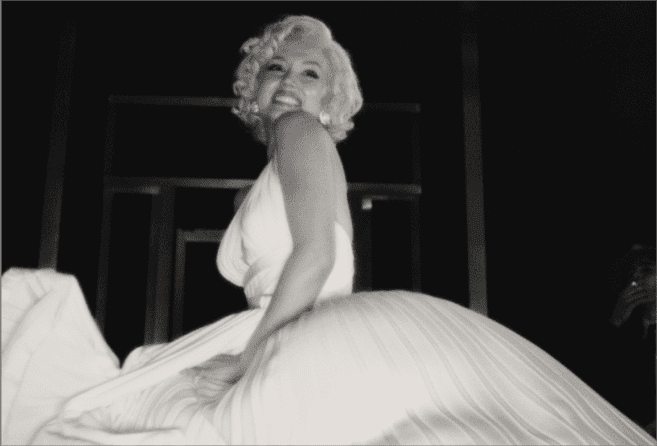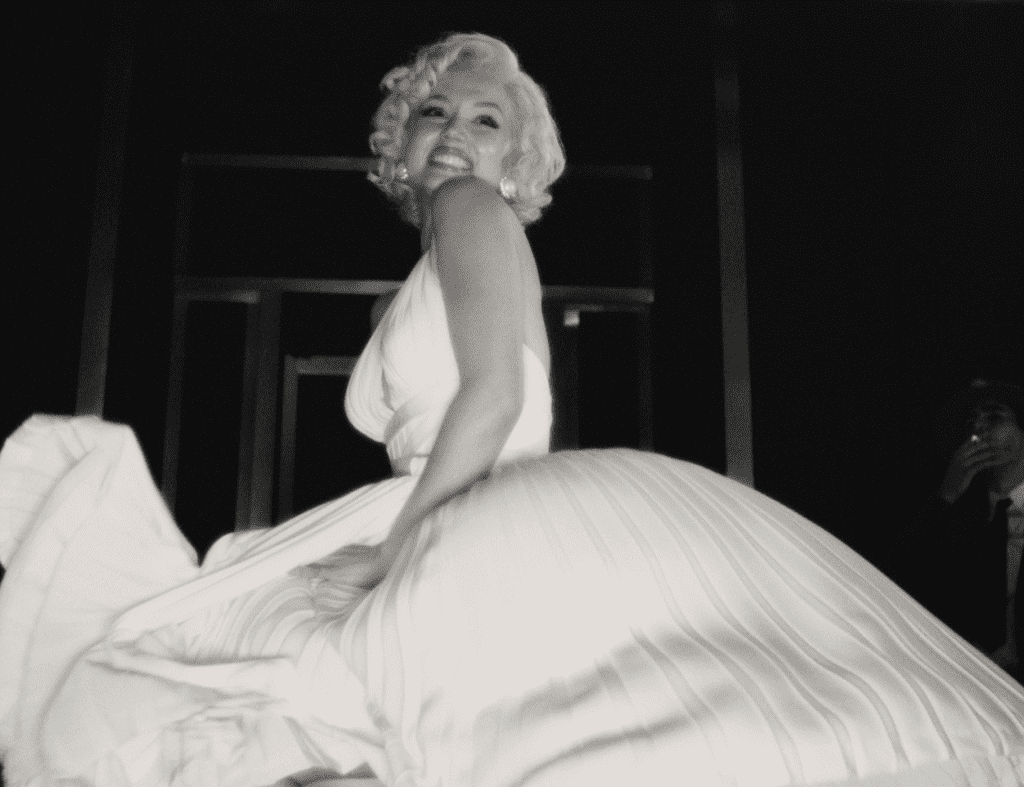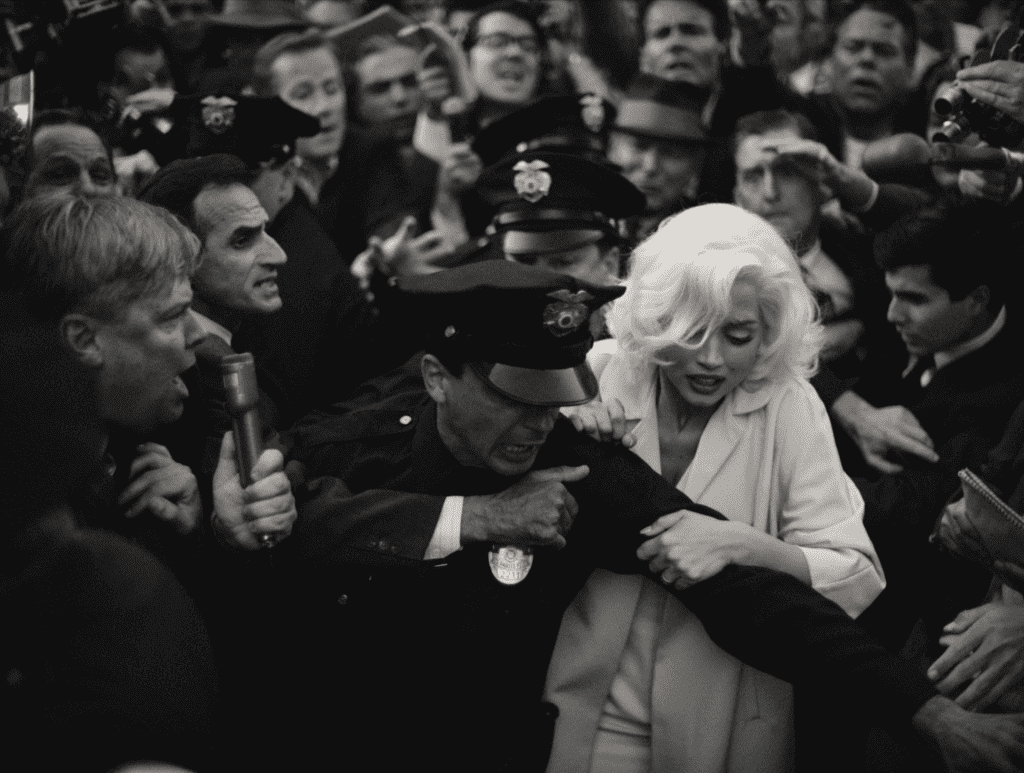

Note: My review of Blonde—before you get stuck in—stems from a negative experience with the film. However, you should also read the positive takes to balance out the bad: Mark Kermode, for example, enjoyed the movie. Robbie Collin at The Telegraph was equally as positive. All things considered, Blonde is a divisive film, and that is one of the successes of Dominik’s work. That it doesn’t appeal to all, that it disgusts and upsets some, but that it makes a cultural impact that lives and breathes once the credits are finished rolling. Now, to the review…
You can gauge a film’s success by the reaction of its audience. Andrew Dominik’s Blonde is almost entirely serious in its fictitious depiction of Marilyn Monroe’s life—and yet there were titters and smirks in the cinema when it was trying to be emotional, and audible sighs when it wanted to be lighthearted.
You’ve probably heard that Blonde is divisive by now. Dominik himself even described the film as a ‘misbehaving child, left alone’; but by his own analogy the director could be accused of some abusive parenting. If that’s harsh (and with the greatest of respect to Dominik, whose The Assassination of Jesse James… remains a masterwork) that’s because Blonde itself is harsh. It doesn’t let up on the misery and dysfunction that haunts Joyce Carol Oates’ fictionalised book on Marilyn Monroe’s life. This isn’t Dominik’s fault, but it is his responsibility. In his hands, Monroe is treated recklessly, like a chewed-up doll—and because he is an inventive filmmaker, one can’t help but think he gets a kick from experimenting with the pain.
Only occasionally do his decisions pay off in an emotional, visceral way: A brilliant use of sound as her breath softens from a drug hit; the chilling opening act about Monroe’s childhood, and the warped mouths of screaming fans. The most satisfying moments are when it veers into the realm of a Lars Von Trier horror flick, but these segments are overshadowed by more artless abuse.
Are these scenes even necessary? Do we need to see Marilyn Monroe bent over and raped by a mute casting-agent? Blonde, we’re reminded (although perhaps not enough to those streaming at home, expecting a glittering Hollywood biopic) is semi-fictional—it’s just that Marilyn Monroe wasn’t. Her life becomes a voyeuristic carousel of cool-looking, brutal vignettes that refashion her legacy. No doubt Dominik is aware that he is touching on themes very prescient in the #MeToo era, but his assumed good intentions overstep the mark, particularly from a male director.
There are actually times when watching Blonde is like being force-fed glass. Again, that’s harsh—but Dominik probably wants it that way. In its long two-hours-and-forty-six minutes, we recoil and cringe as Ana de Armas is beaten, raped, drugged, beaten again; slobbering, vomiting, dragged across floors, raped again (and again) and has her heart broken. You need a certain amount of stamina to keep up with the depravity. There is a scene shot from inside Monroe’s uterus as a baby is aborted. The President of the United States, like a podgy Caligula, forces her to give him oral sex—and we’re forced, in turn, to observe her head bob up-and-down as the camera breaks the fourth wall, zooming out into a cinema auditorium. Are we the ones objectifying Marilyn Monroe? If Dominik is trying to point fingers here, it comes across as a little hypocritical.
As for de Armas’ performance, it is certainly worthy of the acclaim. She endures and is terrorised, but her portrayal displays a very obvious love for Monroe. Does de Armas see herself on those menacing red carpets? Whatever it is, one can’t help but make the connection—the empathy is there in the performance, particularly in one maniacal scene where she laughs at herself in a mirror, as though possessed by a demon. Indeed, the entire main cast is impressive in Blonde. Adrian Brody is comically-endearing as Arthur Miller, while Bobby Cannavale and Julianne Nicholson give strong turns as both the oafish Joe DiMaggio and Monroe’s disturbed mother.
Sadly, they’re all let down by the script. Lines like “We’re like twins…but there’s three of us!” and attempts to introduce humour with her bohemian lovers fall flat. Only Brody offers some laughs—but even then, it’s hard to know what mood Dominik is trying to strike with the writing, and one has to assume that these moments were mistranslated from Oates’ book. Indeed, for all the abuse, one of the worst things to happen to de Armas’ Monroe is that she rarely has a memorable line.

There is a final twist in Blonde, and it is actually quite good. But this moment arrives after two-and-a-half hours of quietly anticipating the inevitable to happen. You check your watch, and it’s time—surely. There’s no spoiler in letting you know that Marilyn Monroe dies early, and in Dominik’s world death is a sweet relief. From an hour in, I was waiting for the end to come so that this poor woman can finally rest; released from the violence, the mental health struggles, and her addictions. If that final gasp of solace was Dominik’s mission all along, then he’s been largely successful. Fame is a living hell.
Blonde will continue to anger and upset a lot of people—largely, and unfairly, because it isn’t what they were expecting in a Marilyn Monroe biopic. It’s not a terrible film, but one with unfeasible ambitions. I suppose audiences will have to take Monroe’s own words on this one: “If you can’t love me at my worst, you don’t deserve me at my best.” Hopefully, the best is still yet to come.



